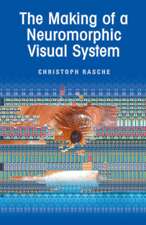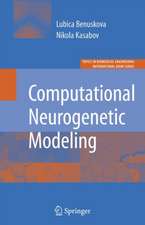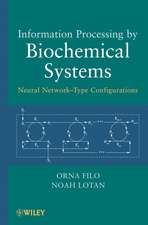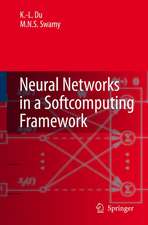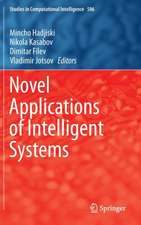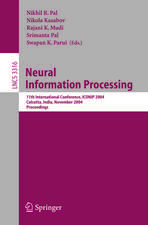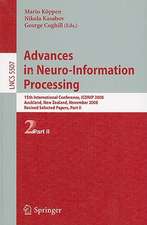Evolving Connectionist Systems: The Knowledge Engineering Approach
Autor Nikola K. Kasaboven Limba Engleză Paperback – 15 aug 2007
Preț: 995.75 lei
Preț vechi: 1244.68 lei
-20% Nou
Puncte Express: 1494
Preț estimativ în valută:
190.56€ • 206.92$ • 160.07£
190.56€ • 206.92$ • 160.07£
Carte tipărită la comandă
Livrare economică 22 aprilie-06 mai
Preluare comenzi: 021 569.72.76
Specificații
ISBN-13: 9781846283451
ISBN-10: 1846283450
Pagini: 480
Ilustrații: XXII, 451 p. 185 illus.
Dimensiuni: 155 x 235 x 24 mm
Greutate: 0.66 kg
Ediția:2nd ed. 2007
Editura: SPRINGER LONDON
Colecția Springer
Locul publicării:London, United Kingdom
ISBN-10: 1846283450
Pagini: 480
Ilustrații: XXII, 451 p. 185 illus.
Dimensiuni: 155 x 235 x 24 mm
Greutate: 0.66 kg
Ediția:2nd ed. 2007
Editura: SPRINGER LONDON
Colecția Springer
Locul publicării:London, United Kingdom
Public țintă
ResearchCuprins
Evolving Connectionist Methods.- Feature Selection, Model Creation, and Model Validation.- Evolving Connectionist Methods for Unsupervised Learning.- Evolving Connectionist Methods for Supervised Learning.- Brain Inspired Evolving Connectionist Models.- Evolving Neuro-Fuzzy Inference Models.- Population-Generation-Based Methods: Evolutionary Computation.- Evolving Integrated Multimodel Systems.- Evolving Intelligent Systems.- Adaptive Modelling and Knowledge Discovery in Bioinformatics.- Dynamic Modelling of Brain Functions and Cognitive Processes.- Modelling the Emergence of Acoustic Segments in Spoken Languages.- Evolving Intelligent Systems for Adaptive Speech Recognition.- Evolving Intelligent Systems for Adaptive Image Processing.- Evolving Intelligent Systems for Adaptive Multimodal Information Processing.- Evolving Intelligent Systems for Robotics and Decision Support.- What Is Next: Quantum Inspired Evolving Intelligent Systems?.
Notă biografică
Professor Nik Kasabov is the Founding Director and Chief Scientist of the Knowledge Engineering and Discovery Research Institute, Auckland, NZ. He holds a number of key positions, including Chair of the Adaptive Systems Task Force of the Neural Network Technical Committee of the IEEE. He has published extensively, and been Programme Chair of over 50 high-profile conferences.
Textul de pe ultima copertă
Evolving Connectionist Systems is aimed at all those interested in developing and using intelligent computational models and systems to solve challenging real world problems in computer science, engineering, bioinformatics and neuroinformatics. The book challenges scientists and practitioners with open questions about future creation of new information models inspired by Nature.
This second edition includes new methods for adaptive, knowledge-based learning, such as online incremental feature selection, spiking neural networks, transductive neuro-fuzzy inference, adaptive data and model integration, cellular automata and artificial life systems, particle swarm optimisation, ensembles of evolving systems, and quantum inspired neural networks.
New applications to gene and protein interaction modelling, brain data analysis and brain model creation, computational neuro-genetic modelling, adaptive speech, image and multimodal recognition, language modelling, adaptive robotics, modelling dynamic financial and socio-economic systems, and ecological modelling, are covered.
An important new feature of the book is the attempt to connect different structural and functional levels of a complex, intelligent system, looking for inspiration from functional relationships in natural systems, such as the genetic and the brain activity.
Overall, the book is more about problem solving and intelligent systems, than about mathematical proofs of theoretical models. Additional resources for practical model validation and system creation are attached as programs in the Appendix. Data, programs, colour figures and .ppt slides are available from: http://www.kedri.info/ and http://www.theneucom.com.
"This book is an important update on the first edition, taking account of exciting new developments in adaptive evolving systems. It is a very important book,and Nik should be congratulated on letting his enthusiasm shine through, but at the same time keeping his expertise as the ultimate guide. A must for all in the field!"
Professor John G Taylor, King’s College London
"This second edition provides fully integrated, up-to-date support for knowledge-based computing in a broad range of applications by students and professionals".
Professor Walter J Freeman,University of California at Berkeley
This second edition includes new methods for adaptive, knowledge-based learning, such as online incremental feature selection, spiking neural networks, transductive neuro-fuzzy inference, adaptive data and model integration, cellular automata and artificial life systems, particle swarm optimisation, ensembles of evolving systems, and quantum inspired neural networks.
New applications to gene and protein interaction modelling, brain data analysis and brain model creation, computational neuro-genetic modelling, adaptive speech, image and multimodal recognition, language modelling, adaptive robotics, modelling dynamic financial and socio-economic systems, and ecological modelling, are covered.
An important new feature of the book is the attempt to connect different structural and functional levels of a complex, intelligent system, looking for inspiration from functional relationships in natural systems, such as the genetic and the brain activity.
Overall, the book is more about problem solving and intelligent systems, than about mathematical proofs of theoretical models. Additional resources for practical model validation and system creation are attached as programs in the Appendix. Data, programs, colour figures and .ppt slides are available from: http://www.kedri.info/ and http://www.theneucom.com.
"This book is an important update on the first edition, taking account of exciting new developments in adaptive evolving systems. It is a very important book,and Nik should be congratulated on letting his enthusiasm shine through, but at the same time keeping his expertise as the ultimate guide. A must for all in the field!"
Professor John G Taylor, King’s College London
"This second edition provides fully integrated, up-to-date support for knowledge-based computing in a broad range of applications by students and professionals".
Professor Walter J Freeman,University of California at Berkeley
Caracteristici
Includes new trends and applications that relate to evolving systems A fully extended, integrated approach to the analysis of evolving information processes at different levels


